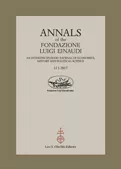During the interwar period, a number of famous writers involved in the debate on the idea of Europe shifted from harsh criticism to passionate defence of democratic liberalism. Among others, the German novelist Thomas Mann passed from a vigorous offensive against the democratic West in the Reflections of an Nonpolitical Men, to the pro-democracy speech The German Republic held in 1922; the French poet Paul Valéry, despite his anti-democratic sentiments, became herald of liberal and democratic Europe since the early 1920s; and the Spanish writer José Ortega y Gasset, which addressed deep criticisms to mass-democracy in The Revolt of Masses, could finally claim for a renewed liberal democracy for Europe. How to explain such contradictory attitudes? What were the main criticisms moved against liberal democracy, and which arguments were put forward in its final defence? The paper presents the fundamental features of what those authors commonly referred to as ‘moral’ or ‘spiritual’ liberalism, and investigates its relationship to the antiliberal tradition of the 19th century (from Maistre to Nietzsche).



